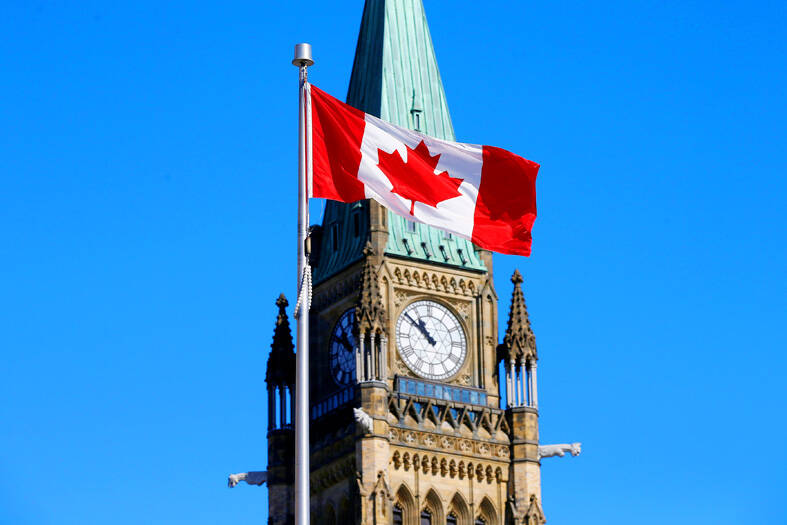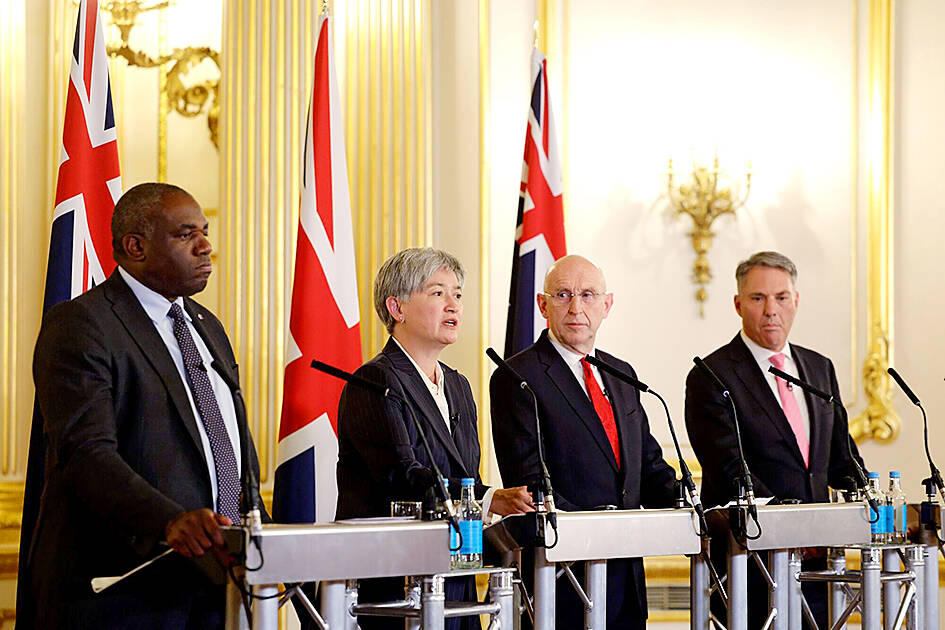Canada should support the peaceful resolution of Taiwan’s destiny according to the will of Taiwanese, Canadian lawmakers said in a resolution marking the second anniversary of that nation’s Indo-Pacific strategy on Monday.
The Canadian House of Commons committee on Canada-Chinese relations made the comment as part of 34 recommendations for the new edition of the strategy, adding that Ottawa should back Taiwan’s meaningful participation in international organizations.
Canada’s Indo-Pacific Strategy, first published in October 2022, emphasized that the region’s security, trade, human rights, democracy and environmental protection would play a crucial role in shaping Canada’s future.

Photo: Reuters
The strategy called for Canada to deepen its ties with Taiwan and other regional partners sharing democratic values, and oppose any unilateral attempt to change the status quo in the Taiwan Strait.
Ottawa should improve Taiwan’s resilience, trade ties and cooperation between the two nations’ peoples by strengthening bilateral collaboration in economics, technology, supply chains, public health, democratic governance and countering disinformation, it said.
The Canadian House of Commons Special Committee on the Canada-People’s Republic of China Relationship — whose members include lawmakers from across the political divide — was created in December 2019 to review all aspects governing the two nations’ relations.

Photo: Bloomberg
Ottawa’s China policy represents substantial differences from Beijing’s “one China principle,” the special committee said in a report entitled “Canada and Taiwan: A Strong Relationship in Turbulent Times.”
The Canadian Indo-Pacific Strategy should govern the nation’s relationship with Taiwan, it added.
Representative to Canada Harry Tseng (曾厚仁) hailed the report as the most important development in bilateral relations since Ottawa switched diplomatic recognition from Taiwan to China.
The special committee’s report last year already included a series of recommendations to improve collaboration on issues concerning diplomacy, security, trade, technology and affairs affecting indigenous people.
The previous report underscored the instability in the cross-strait security situation and the importance of enhancing Taiwan-Canada relations to counter China’s growing threat toward Taiwan.
Meanwhile, a statement issued after a meeting between the British foreign secretary and defence secretary and the Australian foreign minister and defence minister on Monday reiterated support for Taiwan’s international participation and opposition to unilateral change in the Taiwan Strait.
“Ministers underscored the critical importance of peace and stability across the Taiwan Strait. They emphasised that differences should be resolved peacefully and not through the threat or use of force or coercion; and reaffirmed their shared opposition to unilateral changes to the status quo,” it said. “They recognised that the international community benefits from the expertise of the people of Taiwan and committed to working together to support Taiwan’s meaningful participation in international organisations, as a member where statehood is not a prerequisite or as an observer or guest where it is.”
In Taipei, the Ministry of Foreign Affairs said it “applauds and welcomes” the UK’s and Australia’s support for Taiwan, adding that they share Taiwan’s belief in the universal values of freedom, democracy and the rule of law, and that they are a force for peace in the Indo-Pacific region.
Taiwan is an indispensable member of the international community and would continue to cooperate closely with like-minded nations to maintain peace and stability across the Taiwan Strait, participate in international organizations, defend the rules-based international order and contribute to peace and stability in the region, it said.
Additional reporting by Huang Ching-hsuan

AIR SUPPORT: The Ministry of National Defense thanked the US for the delivery, adding that it was an indicator of the White House’s commitment to the Taiwan Relations Act Deputy Minister of National Defense Po Horng-huei (柏鴻輝) and Representative to the US Alexander Yui on Friday attended a delivery ceremony for the first of Taiwan’s long-awaited 66 F-16C/D Block 70 jets at a Lockheed Martin Corp factory in Greenville, South Carolina. “We are so proud to be the global home of the F-16 and to support Taiwan’s air defense capabilities,” US Representative William Timmons wrote on X, alongside a photograph of Taiwanese and US officials at the event. The F-16C/D Block 70 jets Taiwan ordered have the same capabilities as aircraft that had been upgraded to F-16Vs. The batch of Lockheed Martin

GRIDLOCK: The National Fire Agency’s Special Search and Rescue team is on standby to travel to the countries to help out with the rescue effort A powerful earthquake rocked Myanmar and neighboring Thailand yesterday, killing at least three people in Bangkok and burying dozens when a high-rise building under construction collapsed. Footage shared on social media from Myanmar’s second-largest city showed widespread destruction, raising fears that many were trapped under the rubble or killed. The magnitude 7.7 earthquake, with an epicenter near Mandalay in Myanmar, struck at midday and was followed by a strong magnitude 6.4 aftershock. The extent of death, injury and destruction — especially in Myanmar, which is embroiled in a civil war and where information is tightly controlled at the best of times —

Taiwan was ranked the fourth-safest country in the world with a score of 82.9, trailing only Andorra, the United Arab Emirates and Qatar in Numbeo’s Safety Index by Country report. Taiwan’s score improved by 0.1 points compared with last year’s mid-year report, which had Taiwan fourth with a score of 82.8. However, both scores were lower than in last year’s first review, when Taiwan scored 83.3, and are a long way from when Taiwan was named the second-safest country in the world in 2021, scoring 84.8. Taiwan ranked higher than Singapore in ninth with a score of 77.4 and Japan in 10th with

SECURITY RISK: If there is a conflict between China and Taiwan, ‘there would likely be significant consequences to global economic and security interests,’ it said China remains the top military and cyber threat to the US and continues to make progress on capabilities to seize Taiwan, a report by US intelligence agencies said on Tuesday. The report provides an overview of the “collective insights” of top US intelligence agencies about the security threats to the US posed by foreign nations and criminal organizations. In its Annual Threat Assessment, the agencies divided threats facing the US into two broad categories, “nonstate transnational criminals and terrorists” and “major state actors,” with China, Russia, Iran and North Korea named. Of those countries, “China presents the most comprehensive and robust military threat